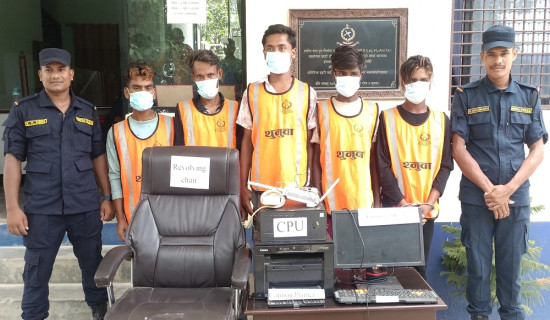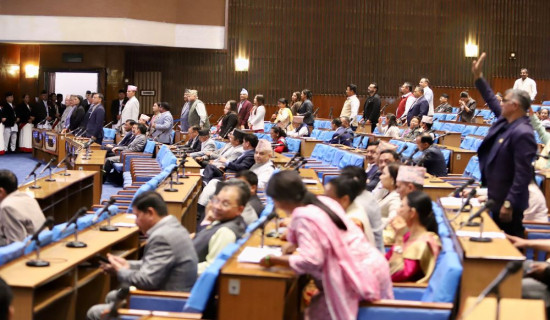- Wednesday, 23 July 2025
Aama: A play about mother’s sacrifice
By Phadindra Adhikari,Lekhnath, July 23: A play Aama, which began on Saturday at Pokhara Theatre’s Gandharva Natakghar, has captured the audience’s attention.
The play is adapted from half a dozen poems from poet Tirtha Shrestha’s poetry collection Dharsai Dharsako Chakravyuha.
The play also portrays the life cycle of an ordinary Nepali woman. It reveals the mindset ingrained in Nepali society from early childhood that says, “You are a girl, you can’t be like a boy.”
The main character of the play, Phoolmaya, is portrayed by Kristi Gurung. Nature makes no distinction between Phoolmaya and her brothers in terms of playful curiosity, but while the boys go to school, Phoolmaya is compelled to do household chores.
As the play depicts Phoolmaya’s helplessness, a poem is presented on stage, in which Phoolmaya never got to bloom. Deprived of the opportunity to develop her personality during childhood, Phoolmaya becomes an adolescent. In her teenage years, her life resembles a tender shoot eaten by frost. She marries Siddhartha, played by Rameshbabu Timilsina. Just seven months into the marriage, this modern Siddhartha is possessed by a ghost of seeking peace. He leaves his newlywed wife and home.
To dream, one doesn’t need formal education, modern techniques, or technology. Nothing stops Phoolmaya’s eyes from dreaming either. When she becomes pregnant as a teenager and her husband abandons her, she begins to dream a mother’s dreams. Even though the dreams are as sharp as wild thorns, Phoolmaya dedicates them to others. She steps over pain and hardship in hopes of a bright future for her child, her son Abhimanyu.
Writer Narayan Neupane has woven a beautiful story from the emotions in the poems. A doll is used to symbolise Phoolmaya’s dreams, and a fictional character named Sapana (Dream) is created, who constantly weaves various clothes from wool symbolising the canvas of Phoolmaya’s future.
According to the plot, poetic verses are presented at intervals throughout the performance. Another turning point comes in Phoolmaya’s life when her son Abhimanyu goes abroad. The face of Phoolmaya in the play reflects the inner turmoil of a woman who forgets her husband’s absence but feels the deep pain of her son leaving the country.
The play again uses elements of fantasy showing a reunion between the souls of Phoolmaya and Siddhartha.
The play thus also highlights the tragic reality faced by many mothers who, after raising their children, find themselves alone and sent to old age homes once the children go abroad to earn. There is room in the play for more intense conflict, and it wouldn’t be unreasonable to expect more natural dialogue delivery from some actors.
Anjali Shahi, Sheetala Adhikari, Sushan Paudel, Dhankaji Shrestha, Prakash Regmi, Shree Krishna Bhandari, Srishti Pangeni, and Rahul Shrestha are the artistes of the play.
The music, lighting, and visual coordination have been done by Kam Parivartan. The play will continue till July 25.





-square-thumb.jpg)





-original-thumb.jpg)




